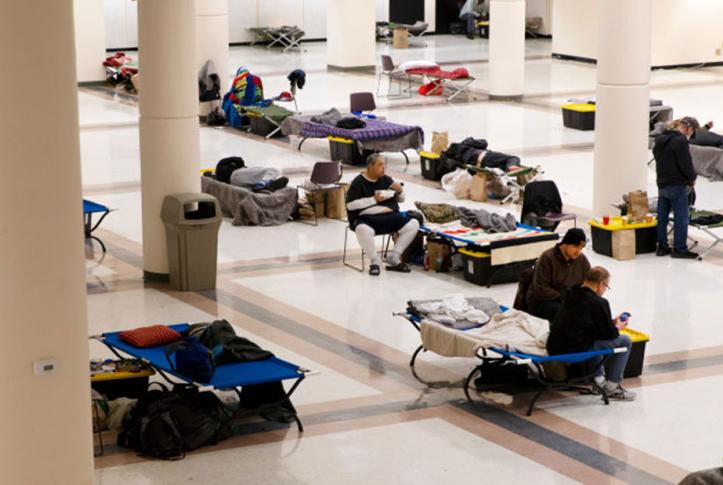[Image caption] The Exhibition Hall at the Seattle Center was turned into a temporary men’s shelter on April 6, 2020, in Seattle, Washington. The space currently has 150 beds six feet apart. It is operated by the nonprofit organization Downtown Emergency Service Center. Photo: Karen Ducey/Getty Images
The COVID-19 pandemic has profoundly affected society’s medically and socially vulnerable populations in various ways: loss of employment, food insecurity, and reduced access to essential medical and social services. Nonprofit community-based organization (CBOs) have been working with the health care sector to address the needs of vulnerable populations. CBOs have an important and unique role in mitigating the economic consequences of COVID-19. However, in a time of deep economic hardship and physical and mental distress — when social services are most needed — many CBOs are facing dwindling resources despite increasing client needs; some are struggling to survive.
The government typically outsources social services, like homeless shelters, workforce development programs, and community centers, to CBOs. CBO funding, which includes government contracts and philanthropic grants, rarely pays the full cost for the organizations to deliver services. Moreover, funders often restrict their grants to direct program costs. This results in chronic underfunding that leaves many nonprofits with minimal cash reserves and makes them particularly fragile in a crisis like COVID-19.
To better understand the specific challenges CBOs are facing, the Nonprofit Finance Fund (NFF), with support from the Commonwealth Fund, surveyed nonprofit leaders across different sectors (e.g., housing/shelter, employment/workforce, human services) and states. NFF is a community development financial institution (CDFI) that provides capital and strategic consulting to nonprofit organizations across the country.
The CBOs surveyed described the long-term implications of the challenges of COVID-19. Responses focused on three key themes:
- Long-term financial survival. Sixty percent of organizations reported destabilizing conditions. CBOs often rely on donations, grants, and fundraising events to keep their doors open. Many are anticipating decreases in donor giving, along with canceled fundraising events to comply with social distancing measures. A leader at a California human services CBO said that “the organizational goal is survival. Social distancing policy will kill special events; the stock market decline will — now and for the rest of the year — limit private and foundation philanthropy; and the closing of our program will hit revenue while all our costs continue.” CBOs like food banks and transitional housing facilities could close at a time when more than 40 million Americans have filed for unemployment.
- Workforce availability. Fifty-six percent of organizations reported limited staff availability due to disruptions in dependent care. One CBO expressed the need for funding to hire additional staff to provide services, like delivering meals to at-risk, older adults. A leader at a New York City human services CBO said, “We serve older New Yorkers, many of whom are now totally homebound. We had 22 new intakes [in a couple of days] and had already had a waiting list of more than 250 and have had difficulty filling staff vacancies, due to low salaries.”
- Delivering services to clients. In a time with immense demand for services, CBOs expressed concern about how to safely meet clients’ needs while social distancing. A leader from a South Carolina health care CBO said that they had “a reduced number of paying clients, and more people needing help,” which meant they would “have to increase our free services which will make it almost impossible to pay our bills and keep our doors open.” Some leaders spoke specifically about needing funding to implement video or telephone tools to remotely serve clients.
Looking Ahead
While no one could have anticipated the current problems facing CBOs, the COVID-19 crisis has thrown other long-standing issues into sharp focus.
According to the NFF 2018 State of the Nonprofit Sector Survey, 19 percent of survey respondents reported having one month or less of cash on hand. If CBOs were funded differently and came into a crisis with four to six months of reserves, they may have been equipped to rapidly address the needs of the most medically and socially vulnerable populations.
Funders are increasingly recognizing that their aid must help organizations pay rent and establish technology capabilities and infrastructure. Funders should consider awarding less-restrictive funds to CBOs in the future to better position them in the event of another crisis. “Restricted funds should be flexible for organizations during this time. We may need them to survive,” said a Colorado leader.
Federal policymakers should consider ways to strengthen and further support CBOs and the social safety net. The CARES Act authorized funding to provide loans to aid small businesses, which includes nonprofits. But it lacked carve-outs specifically for nonprofits and guidance for lenders. Nonprofits have unique business models and it is important for policymakers to consider their financial and operational needs.
Some nonprofits did benefit from the CARES Act; even more may be served by the recently passed Paycheck Protection Program and Health Care Enhancement Act, which earmarked $30 billion to be distributed by CDFIs and qualifying credit unions. Future stimulus packages could consider a specific carve-out to support CBOs and be distributed by lenders that understand nonprofits’ structure and needs. Tailored stimulus programs and longer-term changes to funding policies would allow for more nonprofits to effectively connect to government contracts and deliver the critical services now in high demand across the country. If we do not support CBOs now, during the crisis, they may not survive to provide valuable services to communities through the recovery.





